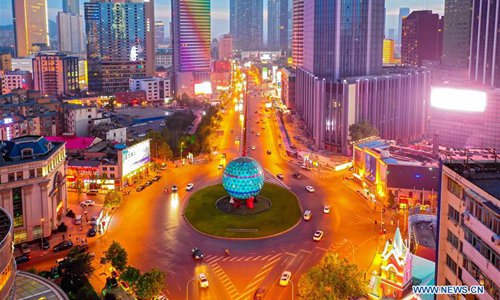Neither de-sinicization nor de-Americanization possible after pandemic
By Chu Yin Source:Global Times Published: 2020/5/19 22:29:33

Aerial photo taken on June 19, 2019 shows the Youhao Square in Dalian, northeast China's Liaoning Province. The 2019 Summer Davos meeting will be held from July 1-3 in northeast China's coastal city of Dalian, with globalization in the spotlight. Also known as the 13th Annual Meeting of the New Champions, this year's forum will feature the theme "Leadership 4.0: Succeeding in a New Era of Globalization." (Photo: Xinhua)
Has the COVID-19 pandemic triggered a process of either "de-sinicization" or "de-Americanization?" This question has been widely discussed by scholars all over the world. The China-bashing campaign during the pandemic, led by the US, has pushed China into a very difficult situation. The US-launched crackdown on Chinese companies and its threat to further decouple with China after the pandemic has provoked speculations - a process of de-sinicization is about to start.
In reality neither a de-sinicized nor de-Americanized trend would happen.
The idea of de-sinicization is an absolute delusion, as China has been playing an indispensable role in the global economy and global supply chain after China joined the World Trade Organization.
According to media reports, the US and some EU countries are planning to reduce their dependence on China economically out of consideration of the so-called security and soaring domestic unemployment. US companies, in particular, have been encouraged to withdraw from China.
However, removing labor-intensive processing industry from China does not equal to a complete decoupling with China or de-sinicization.
Moreover, with one of the world's largest, most comprehensive and complete manufacturing systems, China now has market saturation in certain sectors. Some joint ventures have thus started to look for their market share in other countries, but the phenomenon cannot be argued as de-sinicization.
On the contrary, China's economic ties with many countries, especially those in its surrounding regions, will continue to be strengthened, and China will gradually become a leading driving force for global economy in the second half of 2020 and 2021.
China has contributed almost a third of global economic growth each year since the 2008-09 global financial crisis. It was the first country to resume economic activities after the novel coronavirus outbreak. Although the Chinese economy suffered a sharp decline in the first quarter, the International Monetary Fund forecasts that China will be one of the few economies poised to grow at 1.2 percent this year and rebound strongly to 9.2 percent in 2021.
China's contribution to world economic growth keeps rising, and its international influence and status will grow for sure with the support of its huge market size and efficient political system that is leading a recovery of social and economic order.
By contrast, the image and credibility of the US as a great power have been severely damaged by the epidemic, making many predictions of de-Americanization in the post-pandemic era plausible for certain countries.
US government's botched novel coronavirus response has been obvious to all. Its credibility as a super power is lost in its endless blame games. The beacon of democracy, value of freedom and human rights that the US has long adhered to has been hit hard, leaving many suspect of its global leadership abilities.
As a consequence, public confidence in the US dollar and US bond is bound to fluctuate as well. Moreover, as China's yuan further internationalizes, the dollar's influence is very likely to decline.
However, a weakened US role won't diminish its comprehensive influence. Hence, a complete de-Americanization will hardly happen. US' influence in global security affairs, at least, is still irreplaceable.
The status of the US as an ideological role model has been significantly weakened. However, in the field of security, it remains the pillar for many countries in the world. This does not conflict with China's rise to global economic leadership.
The author is a professor at the University of International Relations. opinion@globaltimes.com.cn
Posted in: VIEWPOINT